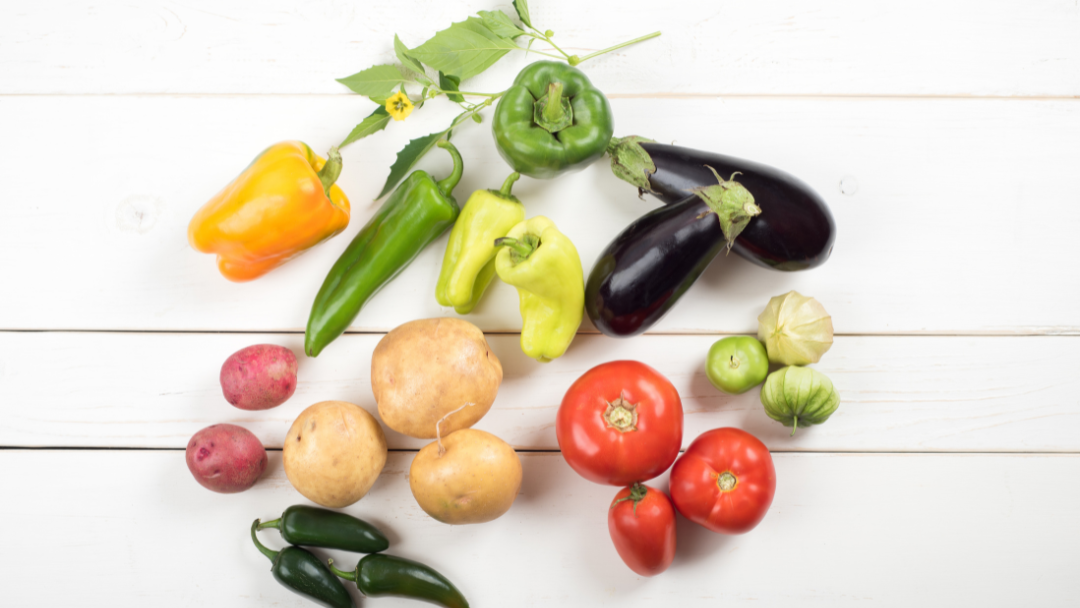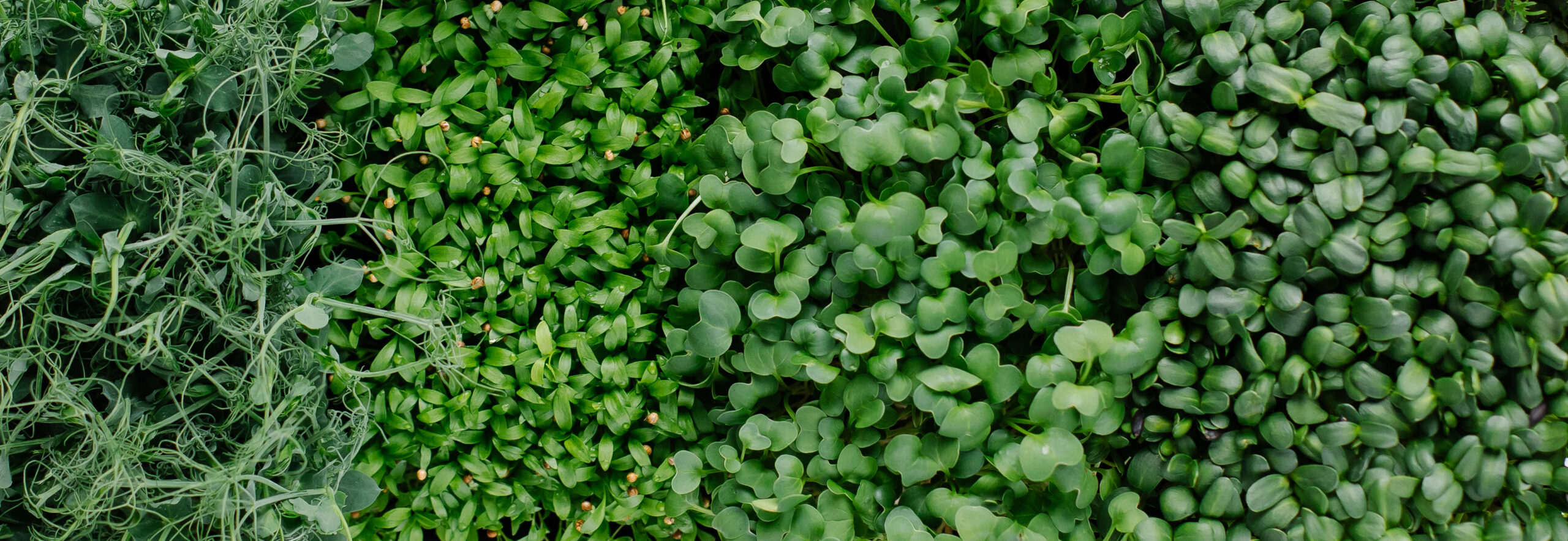Photo: Candace Hartley/Shutterstock.com
There are many debates about which foods should be avoided in the diet. Among items like sugar, dairy, processed foods, gluten, grains, and soy, you may come across the idea that nightshades should be eliminated, especially if you have an autoimmune disease.
Is there any evidence that these vegetables, which often contain healthy nutrients and phytochemicals, should be blacklisted? Let’s see what the evidence has to say about it.
What Are Nightshades?
Nightshade is the term given to the Solanum genus, which has more than 2,000 species. The most commonly eaten varieties include:
- Ashwagandha
- Eggplant
- Peppers (except peppercorn)
- Potato (not yams or sweet potatoes)
- Tomatillo
- Tomato
Why Remove Nightshades?
Those in the anti-nightshades camp generally argue that these plants can be harmful for the following reasons:
Let’s start by looking at the alkaloids and glycoalkaloids in the plants. These are natural pesticides and include solanine, capsaicin, and nicotine. The hypothesis is that since they act as a protection to the plant, they may be toxic to those who consume it. Acute toxic effects can include symptoms such as nausea, vomiting, confusion, and weakness.
In an animal study, the natural glycoalkaloids in potatoes increased intestinal inflammation in mice with two different models of inflammatory bowel disease (IBD). The researchers used fried potato skins with low to medium levels of glycoalkaloids, as well as potatoes with high levels. One IBD model (deficient of interleukin-10 genes) had significantly elevated levels of IFN-gamma compared to controls after consuming the fried skins with medium glycoalkaloid levels. Those in the other model of IBD (dextran sodium sulfate colitis) also had significantly elevated levels of three pro-inflammatory cytokines (IFN-gamma, TNF-alpha, and IL-17) and enhanced intestinal permeability. This inflammatory response increased with higher levels of glycoalkaloid.
An in vitro test on rat and human intestinal mucosal epithelial cells showed an increase in intestinal permeability after exposure to potato and tomato glycoalkaloids, especially alpha-tomatine. However, this only shows a potential mechanistic effect and does not demonstrate what may happen in humans consuming the whole plant with its other nutrients. It is worth noting that the glycoalkaloid content can be decreased through various preparation and cooking methods, such as peeling and boiling potatoes.
There is evidence that potatoes may actually be beneficial for IBD. In one study with 103 participants, there was an inverse association between consuming legumes and potatoes and disease relapse. Those in the highest quartile of consuming legumes and potatoes had a 79% lower risk of having active IBD. In the same study, there was a positive disease association with meat consumption and no association with vegetables, cereals, fish, or dairy. Potatoes have been shown to have other health benefits, in part due to potassium, vitamin C, fiber, and polyphenols.
There is also evidence pointing to the idea that some of the glycoalkaloids may be beneficial. For example, capsaicin has been shown to be effective in controlling pain, as well as having benefits for various health concerns, including obesity, cancer, diabetes, and cardiovascular disease. It has been studied in animal models for its ability to positively modulate the gut microbiota by supporting the growth of Faecalibacterium prausnitzii, Akkermansia municiniphila, and Roseburia.
Some of the alkaloids and glycoalkaloids may also have potential anticancer and anti-inflammatory effects. One study in mice found that tomatidine, a glycoalkaloid in tomatoes, could help to reduce atherogenesis.
As you can see, the evidence is mixed in terms of whether alkaloids and glycoalkaloids are harmful. It may be that some varieties are harmful, while others have potential health benefits, some of which may exist in the same nightshade plant. There may also be a dose-response relationship. Many of the studies thus far are animal studies or in vitro with the glycoalkaloids or alkaloids isolated from the food, which limits the ability to apply that to real-world scenarios.
Many nightshade vegetables contain lectins, which some believe to be anti-nutrients, as discussed in a previous blog. However, when prepared properly, lectins do not have the same toxicity and do not create the inflammation and intestinal permeability that many claim. That being said, it does not mean that some people do not have an adverse reaction to lectins or need to remove them from their diet from time to time.
Other components within nightshade vegetables can exert harmful or healthy effects. Tomato consumption has been reported as a trigger food for gout flares due to their glutamate content. A 12 week study of participants with normal-high blood pressure or grade 1 hypertension found a significantly positive anti-hypertensive effect of eggplant powder supplementation. Psychological state also improved in the group with normal-high blood pressure, perhaps due to the acetylcholine present in eggplant.
Lastly, people can have a food allergy to plants in the nightshade family. A food allergy to potatoes is possible, with those with atopic dermatitis and other food allergies the most at risk. People also report food allergies to tomatoes, eggplants (aubergines), and peppers, although the allergy to eggplant may be from the histamine content rather than to the eggplant-specific proteins. As discussed in a previous blog, when you do present with a food allergy, it is beneficial to remove those foods from your diet.
Is There Evidence for the Benefits of Eliminating Nightshades from the Diet?
There have been some studies that point to a potential benefit of eliminating nightshades in the diet, at least for some people. In one study, removing nightshades improved atopic dermatitis in patients. In a cross-sectional study, 169 patients were surveyed about their diet, and 87% had removed some type of food from their diet. Those who removed white flour, gluten, and nightshades had the best results compared to others, at 53.6%, 54.1%, and 54.1%, respectively. This study was a survey and relied on self-reported outcomes, but it does demonstrate the potential for the removal of nightshades in improving atopic dermatitis for a percentage of people. However, a more recent animal study also showed benefits of using Solanum nigrum as a treatment strategy for induced atopic dermatitis by regulating the immune system.
A study using a survey and self-reported outcomes found that reducing nightshades helped improve symptoms in those who have psoriasis, with 52.1% of those who had eliminated nightshades from their diet reporting skin improvement, which was the third most effective behind alcohol (53.8%) and gluten (53.4%). In this study, 41.5% of responders found that making alterations to their diet (adding or removing items) played a more important role in treating their psoriasis than over the counter medication, complementary medications, prescription medications, exercise, and stress reduction. On the other hand, lycopene, a carotenoid found in tomatoes, has been found to exert beneficial effects on psoriasis in animal models.
The autoimmune protocol (AIP) diet, which is popular for those with autoimmune diseases, incorporates the removal of nightshades. In a small study with just 15 patients with IBD (9 with Crohn’s disease and 6 with ulcerative colitis), 73% reached clinical remission after the 6-week elimination phase of the AIP diet, and all maintained clinical remission during the maintenance phase of the study (five weeks during which no new foods were introduced). It was performed in adjunct to medical therapy, rather than in lieu of.
A separate study of 16 female patients with Hashimoto’s thyroiditis found that a 10-week autoimmune protocol diet led to statistically significant improved quality of life and a 29% decrease in inflammation (hs-CRP).
The autoimmune protocol diet is meant to be a limited-time, elimination style diet to heal the gut and discover which foods to remove from your diet on a more long-term basis.
Conclusion
The research against nightshades, especially in humans reflecting real-world application, is limited at the moment. Some studies point to a potential problem with nightshades in some populations. Thus, although for most people avoidance of nightshades may not be necessary, there is a section of the population for whom it may be beneficial. Those who may benefit the most from a trial elimination are those who have an autoimmune disorder or IBD, but there may be others who also benefit from it, such as those with psoriasis, atopic dermatitis, or other skin conditions.
If you struggle with a chronic illness, have removed the more common triggers from your diet, and consume a lot of nightshades, you may benefit from a trial to see if eliminating them works. Talk with your nutritionist, dietician, doctor, or other healthcare professional to see if removing nightshades may be beneficial for you.
Closing Thoughts:
- Nightshades are a genus of plants with more than 2,000 species. Familiar foods include eggplant, peppers, potatoes, and tomatoes.
- Some people argue that nightshades can be harmful because they contain alkaloids, glycoalkaloids, and lectins and may increase inflammation and allergic reactions.
- On the other hand, there is other evidence that alkaloids and glycoalkaloids may be beneficial for numerous health concerns, including obesity, cancer, and more.
- Proper cooking and preparation methods can decrease the percentage of potentially problematic components found in nightshades, such as glycoalkaloids and lectins. Strategies include peeling and boiling.
- Research against nightshades is limited, but it may be beneficial for some individuals with specific conditions to remove nightshades at least temporarily to see if they enjoy health improvements. Remember to speak with your healthcare practitioner to see if removing nightshades may be beneficial for you.
If you plan to make dietary changes, have food allergies, or have questions about which foods are best suited to your personal needs, talk to your doctor, nutritionist, dietician, or another member of your healthcare team for personal options based on your individual circumstances.





